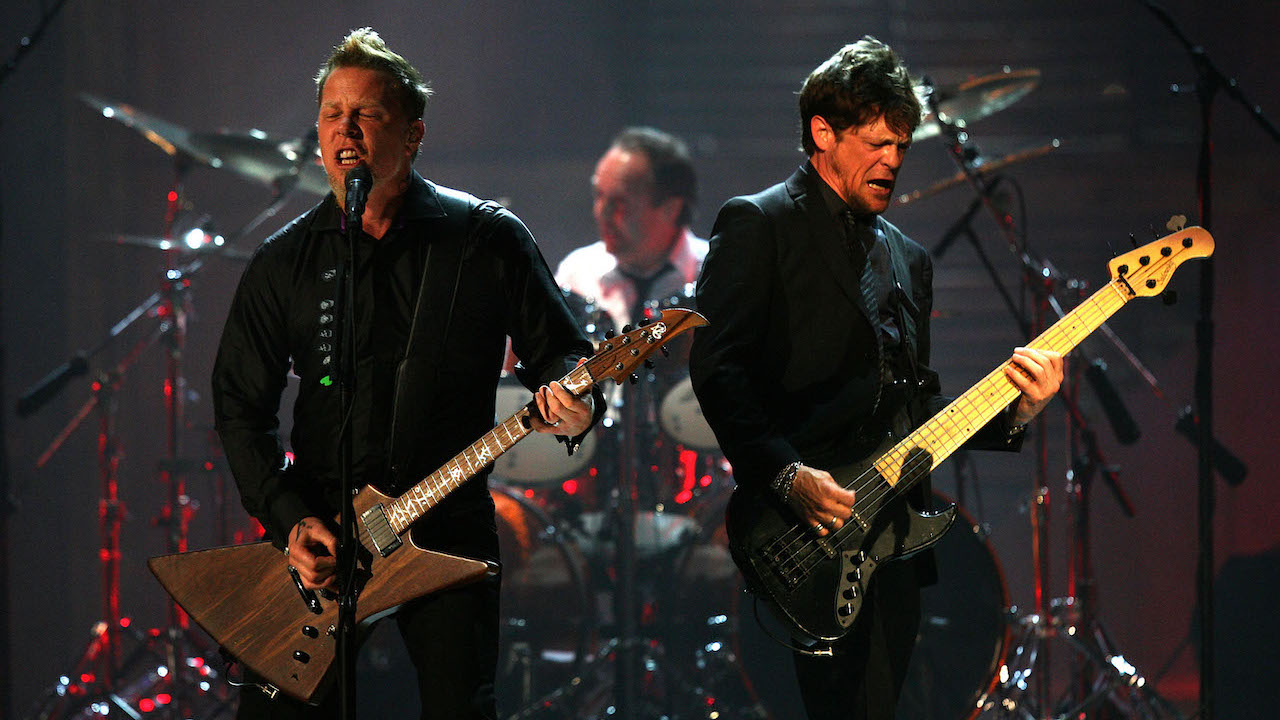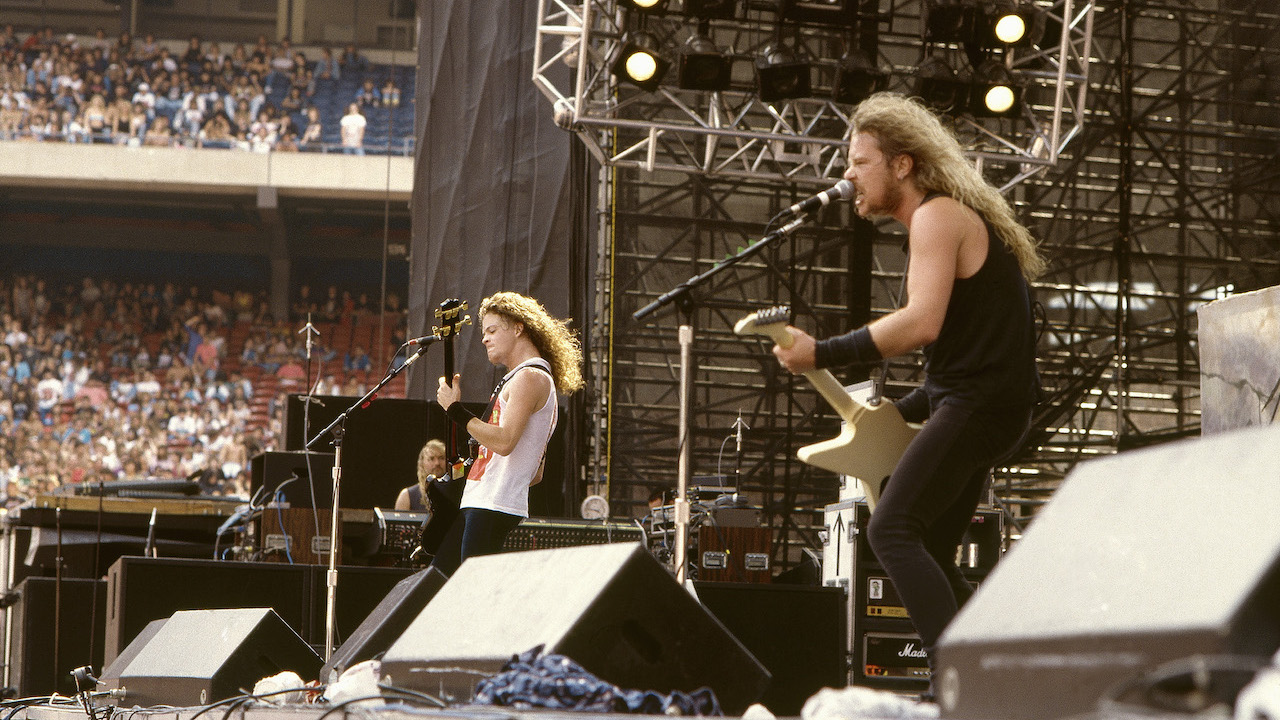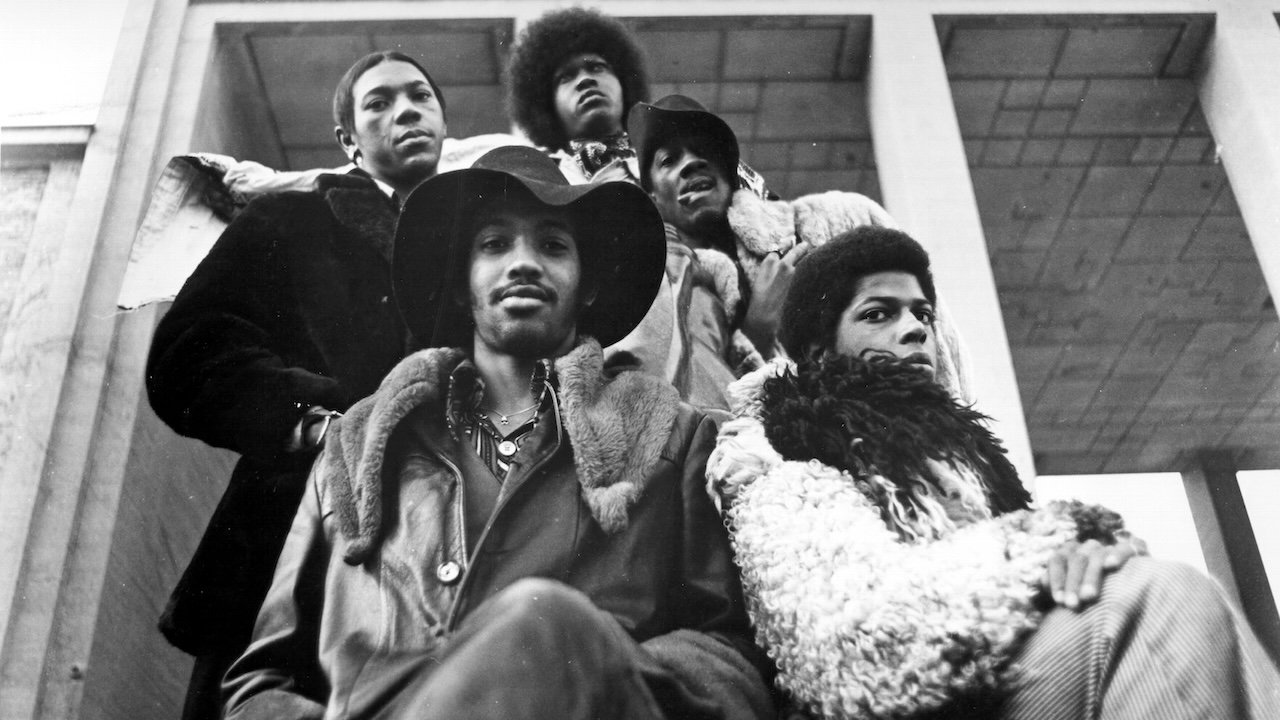“Hetfield would say, ‘Dude, get that bass s**t happening!’ It was a breathin'-down-your-neck type of thing...” Jason Newsted on the making of Metallica’s Load album
The ex-Metallica bassist recalls the making of Load and why James Hetfield had a lot to do with the bass

All the latest guitar news, interviews, lessons, reviews, deals and more, direct to your inbox!
You are now subscribed
Your newsletter sign-up was successful
Following the tragic death of legendary Metallica bassist Cliff Burton in 1986, Jason Newsted had worked hard to get his name to the band, and felt certain he was the bassist they needed, but Burton was no easy act to follow. Looking back in 1999, Newsted told BP that “I wouldn’t wish my first years in Metallica on my worst enemy as far as the emotional stress goes, but I always felt I was the guy to take over from Cliff.”
Newsted’s bass sound didn’t always feature highly in the mix during his early recordings with Metallica, but on Load, his fourth record with the pioneers of thrash metal, his growling 4-string – tuned down a half-step – drove the band, along with Lars Ulrich's signature kick drum. Newsted even braved a fretless bass guitar on Until It Sleeps. Had he finally earned the props he deserved?
“Metallica had just celebrated its 15th anniversary and we had finally discovered how you're supposed to put things together,” said Newsted. “We used to be much more meticulous in the studio; James Hetfield would come in six hours after I was into the first song and say, ‘Dude, what's up with that?’ It was a breathin'-down-your-neck type of thing... ‘Get that bass shit happening!’
“With Load, I went in with engineer Randy Staub and producer Bob Rock, and we went crazy on the bass. If the bassline just went dun, dun, dun, dun, I'd make it swing like it never did before. The other guys would come in and listen to the bass and ask, ‘What's that?’ They expected it to be straight, but after they had listened to it a few times, they'd start snappin' their fingers. They even changed guitar parts to go with the bass, which was the first time that's happened.”
Newsted went on to play with Metallica for 15 years before being replaced by Robert Trujillo in 2003. This interview is from the April 1997 issue of Bass Player, which followed the release of Load.
Let's talk about the new record. There seems more room for the low end to breathe.
“The construction of the songs was the main factor. There was also a lot of counterpoint playing and feeding off each other. The first single, Until It Sleeps, was actually the only song we've ever written in the studio while jamming. Somebody played a riff, we counterpoint-played for a second, and that was the first single. It was a special, cool thing.”
All the latest guitar news, interviews, lessons, reviews, deals and more, direct to your inbox!
So you've gone back toward a more traditional style of bass playing?
“Yeah, I'm still evolving in that direction. The parts are more simple; if you let 'em get going too much, they could easily get away from you and lose their groove. It's easy to turn on the faucet all the way for an hour, but to be able to do that for ten minutes, and then go to a mid-tempo song, and then go to Nothing Else Matters and try to sing for real instead of just barking – that takes more focus and control. Fast doesn't equal heavy. Even when you're playing a slow song, you can create a heavy mood. That's part of being an entertainer.”
How closely did you work with James Hetfield in the studio?
“James had a lot to do with the bass parts on this record; he planted the seed in me that the bass can go to different places. His songs are always really good, but now I've realized it's up to me to make them great. His songwriting is always going to be up here, and I'll always write metal-101 songs and love 'em. That became clear to me by the time I went in to play my tracks on this record, so I just applied myself to the songs and focused on the pieces.”
Did James ever make any bassline suggestions to you?
“If he did, it was when I first heard the songs in Lars's Dungeon, which is an eight-foot-square room with a full drum set and three Marshall stacks. The first time I was shown the tunes, I'd take notes and then record my parts; if James heard something that was clashing, he'd let me know as we went along. It used to be more of a 'Do this' kind of thing, but now it's more of an approval and an appreciation. James had heard some of the tapes I made in my studio and knew I had been playing a lot, so he just showed me the songs. He knew I could do it.”

So you're happy with the outcome?
“I really am. Five years ago, I'd be kind of down if I didn't have a writing credit for the initial riff of a tune on a record, but being the bass player in Metallica and making James's songs better is how I have to approach it. When we did the tour for the black album and the record was selling 14 squillion copies and every show was sold out, it seemed like I could do a freakin' four-minute speech and the crowd would always go crazy. Then I'd do eight minutes of bass meandering, but I would never subject people to that again. Now, I do a one-minute-long bass solo and that's it – no more words, unless I have something to say that day.”
I hate to use the word "maturing," but....
“I don't mind that, because I think that's good – although sometimes it sounds more like aging. I'm still young inside and I'm such a big fan of music. You don't have to grow up, but you can get older and become more considerate. And you can make grown-up decisions, which we all have to do.”
It sounds as if you've been through some musical changes since the last Metallica record?
“My musical interests keep getting wider. I love listening to tribal, indigenous music and to Alan Lomax's recordings and the Smithsonian Institution stuff. There's a custom in some cultures where there's one song that's your name. And when it's time for customary celebrations, you sing your song and present it to the village. The idea that music can be so internally instilled makes me think very deeply. I've also been reading about blues and jazz players to see how certain types of music were created. Its purity has opened me up to the 'no rules' thing – just lettin' it fly and not worrying about how long a song is.”
Any favorites?
“Son House, man. He's tops for me. And Muddy Waters, Robert Johnson, Howlin' Wolf, Leadbelly... there are tons of others. As for jazz, I like some of Miles Davis's older stuff, some Coltrane, and older big-band stuff, such as Duke Ellington and Count Basie. Louis Armstrong did amazing things as far as presenting crazy music to white people and eventually getting mixed bands to play for mixed audiences. I like Charles Mingus, too; I just bought a video recorded in 1968 that shows him in his apartment loft shootin' holes in the ceiling with a shotgun. He'd walk around, sing to himself, and then go over to the piano and knock it out.”
There are a couple of tunes on Load that will surprise Metallica's more hardcore fans.
“Hey, I'm down with the guys who want Napalm Death and Sepultura – that shit is cool. Sepultura is my favorite band on the planet. And I can appreciate the people who want us only to go fast, but don't disrespect the people who paved the way and broke down the doors for so many of the groups you enjoy now. One of the bands that played a big part in that was Metallica. We're the guys who wrote Damage Inc., Fight Fire with Fire, Whiplash ... you name it, we helped to invent it. And we can still play it better than anyone. I'll go up against any death-metal band – pound for pound, hour for hour, we'll crush 'em. I have great for respect them, but those are the facts.”
Load is available to buy or stream.

Nick Wells was the Editor of Bass Guitar magazine from 2009 to 2011, before making strides into the world of Artist Relations with Sheldon Dingwall and Dingwall Guitars. He's also the producer of bass-centric documentaries, Walking the Changes and Beneath the Bassline, as well as Production Manager and Artist Liaison for ScottsBassLessons. In his free time, you'll find him jumping around his bedroom to Kool & The Gang while hammering the life out of his P-Bass.

